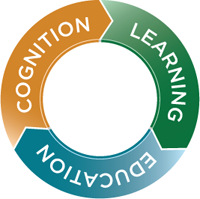
Chapter 03: The Knowledge-Learning-Instruction (KLI) Dependency: How the Domain-Specific and Domain-General Interact in STEM Learning
Editors
Mark A. McDaniel, Regina F. Frey, Susan M. Fitzpatrick, & Henry L. Roediger III
Files
Link to PDF Full Text
Description
To enhance student learning it is necessary to identify the concepts and skills that need be required with the instructional method that best supports learning. The hypothesis that suggests the choice domain-general instructional approach depends on the domain-specific nature of the target knowledge the KLI Dependency. To produce theoretically motivated, successful educational interventions, consideration must be given to domain-specific details as well as domain-general principles of instruction. Successful use of general principles depends on a careful domain analysis such that a principle in one domain context may work completely different in another. An example of effective instruction that incorporates both knowledge analysis and instructional principles and offer recommendations for applying KLI to (re)design instruction and improve student learning is discussed.
Document Type
Chapter
ISBN
978-1-941823-00-2 (MOBI), 978-1-941823-01-9 (ePub), 978-1-941823-02-6 (PDF)
Publication Date
9-10-2014
Publisher
Washington University Libraries
City
Saint Louis
Disciplines
Cognitive Neuroscience | Cognitive Psychology | Educational Psychology | Engineering Education | Higher Education | Higher Education and Teaching | Science and Mathematics Education | Teacher Education and Professional Development
Recommended Citation
Koedinger, K.R. & McLaughlin, E.A. (2014). The knowledge-learning-instruction (KLI) dependency: How the domain-specific and domain-general interact in STEM learning. In M. McDaniel, R. Frey, S. Fitzpatrick, & H.L. Roediger (Eds), Integrating cognitive science with innovative teaching in STEM disciplines [E-reader version] (pp. xxx-xxx). doi: http://dx.doi.org/10.7936/K76Q1V59




Comments
Chapter 3, Integrating Cognitive Science with Innovative Teaching in STEM Disciplines. Chapter DOI: http://dx.doi.org/10.7936/K76Q1V59. Link to complete book available at: http://openscholarship.wustl.edu/books/9/ Complete book available for purchase through Amazon and Apple. For information about alternative versions, please contact digital@wumail.wustl.edu. Arranged for publication, sale, and distribution in electronic and print form by Washington University Libraries. All articles Copyright © 2014 by the individual authors.